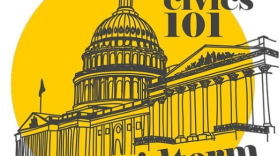There are new poll numbers out this week on political races in New Hampshire, and they come from a brand-new polling outfit.
Students at Phillips Academy in Andover, Massachusetts, one of the nation’s most prestigious private high schools, have launched what they believe is the first high school-run public opinion poll in the country. The teenagers behind The Phillips Academy Poll may be too young to vote, but they view the survey as an alternative way to impact political discourse.
“Just by the nature that I'm not able to vote I feel like it can be difficult to get my voice heard,” Patrick Chen, a 17-year old junior and the poll’s executive director, said.
After nearly a year of preparation, the students launched what they argue is a methodologically sound poll of registered voters, with the swing state of New Hampshire as their first data source. And due to the lack of polls in the field at this point, politicians and die-hard politicos are already engaging with the results.
Using a random dialing program of 603 area code numbers, the automated poll contacted 471 voters in New Hampshire, asking questions about the race for governor (Chris Sununu outperformed challenger Tom Sherman, 72%-24%), hypothetical match-ups in the race for a U.S. Senate seat (Maggie Hassan beat both Don Bolduc and Chuck Morse), and generic ballot questions (Republicans defeated Democrats 48%-36%).
“[With] polling, there is so much more than what it appears on the surface,” said Chen, who worked with a team of students and a faculty advisor to design and carry out the poll.
When the results were announced earlier this week on Twitter, the findings generated attention among politicos, and was picked up by the polling aggregator site FiveThirtyEight.
But pollsters love picking apart other pollsters' work, and criticism is something Chen said he was ready for.
“As a high school, we expected there would be some skepticism about our accuracy, but we are very confident in our results,” he said.
Some of the critics said the high schoolers’ reliance on robocalls, or what’s known in the industry as interactive voice response, is potentially flawed. While it’s a cheaper, faster method to reach people, only a tiny fraction of respondents – in Andover’s experience, between 2-3% of those contacted – stay on the line to complete questions.
“Why would you want to talk with a computer about your views on politics unless you really want to express your views on politics,” said Andy Smith, who oversees the University of New Hampshire Survey Center, which regularly produces polls on New Hampshire voters.
Smith didn’t join the online discussion about the Andover poll, but he said just using interactive voice response, without a supplemental online survey or other polling tool, gives him some pause.
But Smith noted that since the 2016 election, when a number of major polls inaccurately predicted results, the entire industry is “in midst of a paradigm shift” about what methods still work in an increasingly distrustful society.
“The old methodologies that we used to consider gold standard...those have become problematic in recent years,” said Smith.
He praised Andover’s use of a statistical process called raking, in which preliminary findings are weighted based on variables including demographics and political affiliation.
“These are high school kids, I give them credit for what they did,” Smith said. “I'm not going to pile on to anybody saying the survey is no good, because it is frankly as good or better than a lot of other surveys being conducted by major organizations.”
With more than six months until the general election, there are few polls to compare the Phillips Academy Poll against.
But for candidates and parties, even early poll data can be perfect fodder for fundraising appeals or attacks.
“You can expect that they are going to use it to their advantage, or discredit it, if they don’t like what the findings are,” Karen Hicks, a long time political strategist in New Hampshire, said. “They’ll attack the methodology, they’ll attack who did the poll.”
True to form, within hours of the Andover poll coming out, the National Republican Congressional Committee fired off a press release, saying the results, which favored Republicans on the generic ballot, show that New Hampshire Democrats are “doomed.”
For Chen and his colleagues, they are happy to debate their poll’s methodology, and said they have no issue with candidates and political parties using the results for their own ends.
In the coming months, the students plan on turning to other swing states, tracking the electorate’s leanings through the midterm races in November.
“I think the more voices that are heard, the better,” Chen said. “With every political poll, more people are contacted and are able to share their opinions, and I think that is very valuable at this time.”








